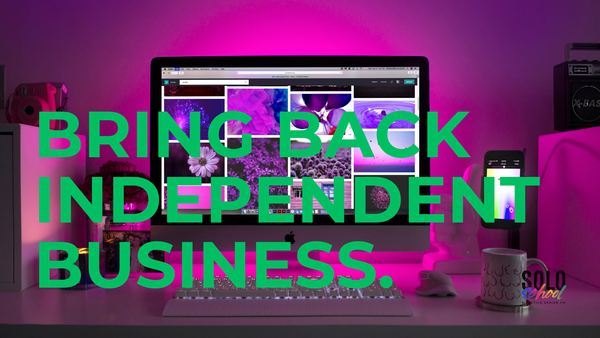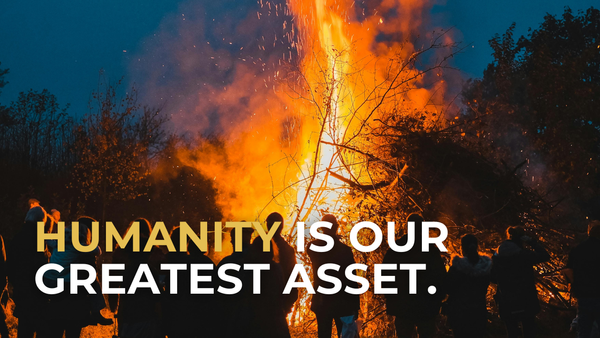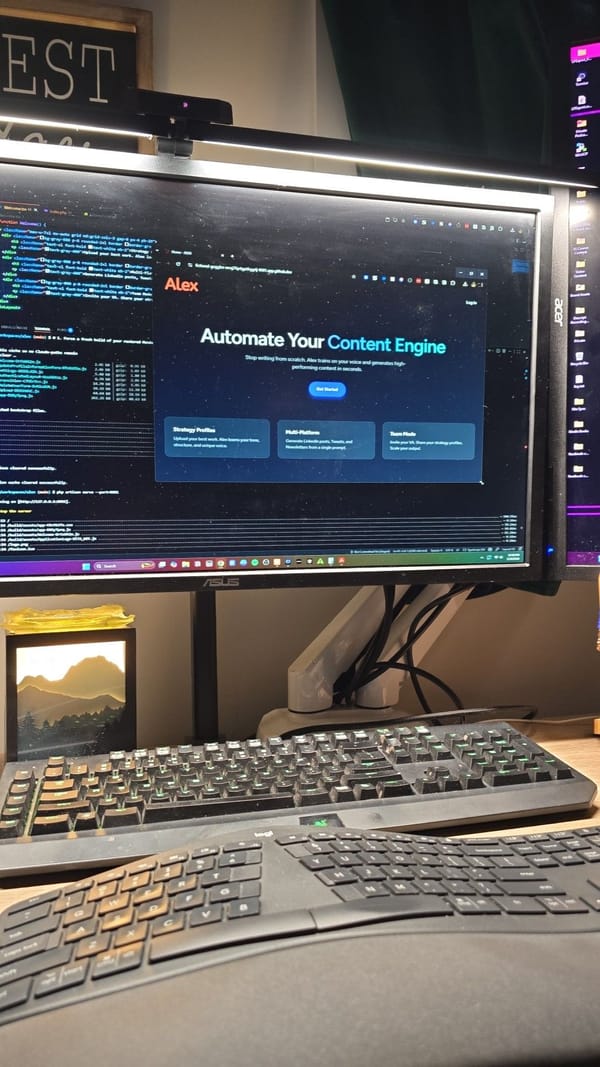I’m such a dinosaur, I remember the early days of the internet.
Not like the ARPANET early days, I was a toddler. But back when digital commerce was just starting to be a thing.
People used to fight for something called “net neutrality” - the idea that ISPs shouldn’t block certain websites and should allow equal access to all resources. For years, they wanted to use the internet to deliver their own cable or streaming services and have it not “count” toward your usage - only other providers would. The people of the internet believed that this would open a slippery slope to large corporations controlling what we can and can’t access online, so they fought it.
I can only imagine how some of them feel now.
The promise of the early internet, the “dot com bubble” that burst due to a complete lack of business planning or focus on profitability, was centered around the idea that anyone with an internet connection would now have the chance to reach a global audience with their work.
Today, that’s true - if you use Meta’s Facebook, or optimize for Alphabet’s Google, or rank your products highly on Amazon’s Marketplace, or…
The tech oligarchs have taken what was intended to be a freely accessible resource - a place where any individual could have access to a global audience and reach millions - and essentially become digital landlords, owning every platform we can use to access the public while also driving other platforms out of existence.
In this process, we have lost so, so much.
Everything looks the same now. Every website, every product is the same “generic” colour or branding to appeal to the widest masses and get algorithmic approval.
Every piece of content uses the curiosity gap to drive clicks and retention, following the same structure so the lords of our digital lands will allow their algorithms to disperse it.
Even our physical products like clothing and books, what used to last 20 years now lasts 2 months (if we’re lucky) and is made in China for 10% of the cost (as many of you are suddenly learning on TikTok.)
Our farms are monoculture crops. Our stores have the same interior look and feel in every location, worldwide.
Branding is important, but when 10 brands own half of everything, their branding becomes a design pattern. The standard. Not just their unique look.
The internet, the economy of today makes “You’ve Got Mail” look quaint - even Tom Hanks’ bookstore would be gone by now.
Did you know we can actually fix this ourselves?
Yeah. Like, you and I. We don’t need to wait for politicians or venture capitalists to wake up and do this for us, because frankly, they won’t. It is literally detrimental to them.
We can fix this, and honestly, we have to - because no one else will.
So, how do we fix it?
We “re-indie” everything.
Indie music was just music without a big record label attached to it. It stood for “independent music” - and it was often just artists buying studio recording time and selling and distributing their own albums.
Now we have the chance to take everything indie, and I think we should.
Here’s how it works:
- You buy everything you can directly from the person who makes it
- If you can’t buy it from the person who makes it, you buy it from a small business that sells or distributes the product on behalf of the person who makes it (like a retail store, in person or online)
You do this to the best of your ability, being kind and patient with yourself, understanding how your need to do this may intersect with various other privileges, constraints, capacities, and needs.
If we all did this? If we all made the decision only to purchase directly from small scale producers or the small businesses that retail for them?
- The massive mega-platforms that profit exclusively off of the retail markup of other peoples goods would no longer be economically viable, and
- Companies would face economic pressure not to grow beyond a certain size and lose their customer base, thereby capping the concentration of capital which is what is currently straining the market so heavily.
Our economy was not meant to function with such a small number of organizations holding such massive wealth. For capitalism to even work at all, money must flow through the hands of all people - not just into the hands of capitalists for them to hoard like dragons.
I’ve been doing this lately.
My website is now hosted by a small local company who owns their servers and leases a physical building about an hour from me.
I buy my bread from a local bakery. My eggs from a farmer. My milk from a dairy. My veggies from a produce stand. My meat from a butcher. Even my “big box” groceries are from a regional chain, not a national or international one.
We thrift before we buy new, but we’re supporting the local thrift shops now. The non-profits run by volunteers, the local consignment shops, the mom-and-pop Finders Keepers style stores.
I buy my books from a bookstore run by a retired realtor, near the coffee shop that’s part of a chain that only exists within about 90 mins of here. That’s when I’m not borrowing them from the regional library, of course, when I stop by the local park with their outdoor gym. The more people they see using those facilities, the more they’ll build.
My plants come from the local greenhouse. My yarn from the local yarn store.
I’m back to buying from independent producers and retailers almost exclusively.
I understand that this is a privilege.
Not only a financial one, either, but a privilege of ability and capacity. I have:
- The physical ability to visit these stores
- A vehicle capable of taking me to them without relying on unreliable public transit
- The financial ability to pay the increased cost for goods at these stores, since they don’t benefit from economies of scale
- The time to take half my Saturday to go grocery shopping and making all of these stops
- The sensory regulation from other areas of my life that allow me to do this many sensory-intensive activities back-to-back like this
- And a ton more privileges!
I bring this up not because you can’t do this if you don’t have those things, but rather for everyone reading to understand that if you can’t do this because you lack one of those privileges, it’s okay. It is okay to not stretch yourself thin or cause yourself harm to do this.
And yet, I’ve also had to make several changes to the way I do things in order for this to be possible. I have:
- Started exercising more regularly, specifically because it makes these tasks easier
- Invested in an EV to make these trips more sustainable and less costly to drive the extra miles
- Purchased less in order to cut down on costs, especially snacks, luxury items, and meat - we’re now vegetarian at least 3-4 nights per week
- Cut my work schedule down so I could make time to meal plan on Friday, so the shopping is possible on Saturday - the one day it makes sense to do it.
- Invested heavily in sensory-friendly clothes, shoes, headphones, and eyewear, to make the physical trip to the big box store less difficult
And more.
I’m making sacrifices to do this, but they’re paying off massively.
I spent years of my life removing friction from the activities of daily living as much as I could. Delivery service? Sign me up! Auto-ship? Let’s do it! If it could happen without me thinking about it, I signed right up and made it happen so that I could spend my mental energy thinking about other things.
What ended up happening?
I lost touch with my life. I lost the joy of picking out my vegetables. I lost the feeling of the sun on my face while I walk into the coffee shop, the smell of the espresso roasting and the dull chatter of people meeting and connecting. I lost the smell of fresh baked bread at the bakery, the feeling of the dust jackets at the bookstore as I browse, the sound of the vinyl records as I flip through them one box at a time.
Having sensory issues isn’t just about heightened senses causing difficulty, though of course they do. It is also about the lived experience of those senses, and what we lose when those things are stripped away.
On the baby internet, way back when, they fought for net neutrality.
And today, because of massive platforms like Meta and Alphabet and Substack and Amazon, we are all just factory workers in a digital factory of knowledge and information.
We’re still not the factory owners.
And now, instead of being paid to make widgets for the factory owners to profit off of…
… we’re paying THEM for the privilege of making the widgets!
We don’t own the factory. We don’t own the machines. We don’t control production. We don’t ever know if something will sell or not.
We take on all of the risk of producing our work, and the platforms who use us take all of the benefits - the attention and capital we invest in them - for themselves.
We CAN do better.
There is no reason to use Shopify when OpenCart exists.
There is no reason to use Substack when Ghost exists.
There is no reason to use Amazon Web Services when your local host exists.
There’s no reason to use KDP when Lulu exists (and donates millions to Creative Commons, open source, and the Open Library Project, among other things!)
There’s no reason to use Kindle when Kobo exists (and supports local booksellers!)
There’s no reason to use Stripe or PayPal when Helcim exists (and only marks up the network fees using totally transparent pricing, instead of flat rate price gouging!)
There is no reason to use a massive global platform when human connection exists.
Supporting independent businesses as much as you can, wherever you can, is uncomfortable. It is less convenient. It requires some choices and adaptations. And it isn’t always possible!
Whether it’s because of your own intersectional needs or because the massive platforms drove the independent competitors out of business, it’s not always possible.
But doing it as much as you can will:
- Encourage intentional consumption, decreasing waste
- Build community through tangible experiences and connections, creating a sense of belonging to counteract the isolation and disconnection we’re all feeling right now
- Foster economic sovereignty of individuals, organizations, and communities, by allowing them to maintain control over operations and profits
- Preserve culture, because independent companies don’t have to appeal to billions of people in order to meet their growth goals - ending Millennial Grey as we know it
- And so, so much more.
I’m not going to pretend I have all of the answers or that we can fix all of society's problems by shifting late-stage capitalism to a different, hopefully-slightly-less-shitty form of capitalism.
But I will say that until the people find a way to take power back from the few who hoard the wealth of these platforms and take it for themselves, there is almost certainly no way forward.
There is no future where they are still rich,
and we are all thriving.
We must divest of massive corporations. It’s no longer an optional stance. Independent businesses must get the attention and support they need to thrive.
If we all stop using AWS services and buying on Amazon, Jeffie B. isn’t a billionaire anymore.
If we all stop shopping at Walmart, the Waltons can’t afford to lobby the government anymore.
We've already watched in real-time what happens when even SOME of the market divests of a company like Tesla.
These very powerful people only have ONE kind of power, and it’s money. If we stop giving them the money, they no longer have the power.
If we give the money to our friend, our neighbour, our neighbourhood baker, THEY have the power instead.
If we have any hope of getting through this ridiculousness with any semblance of quality of life, our only choice is to go back to supporting independent businesses wherever and however we can.
Including owning and operating one of our own.
- Cheryl
Solo School applications are now open for the May cohort!
Do you run an independent business, or do you want to? Have you been looking for resources to support your growth journey that are specific to neurodivergent adults? Tired of getting advice like “just be consistent” when you know it doesn’t f*cking work like that?
Solo School has now opened applications for our May cohort!
We’re now operating on a lifetime access cohort model, so you can get to know your classmates and find some peers to support and network with while also keeping lifetime access to our training, coaching, and community.
Get a step-by-step path from ideation through expansion in Solo School, the world’s first (and as far as I can tell, ONLY) business education program exclusively for neurodivergent entrepreneurs!
Click here to learn more and apply for the May cohort of Solo School.
Business Adaptation of the Week
A backpack. Yeah, that’s kind of a weird one, but hear me out.
I put my binder with my planning notes in it. I put my tablet and keyboard case and mouse in it. I put my knitting in it. I put my notebooks in it. I put my library book and my Kobo in it. I put my earbuds in it. I have lip balm and hand cream and fidget toys.
And now, instead of running all over the house every time I need anything, I just carry around my backpack and it contains anything I might want to do anywhere in the house on a given day.
It comes to work with me, it goes to bed with me, it sits by the couch in the living room with me on the rare occasion lately that I actually get to sit down 😂
I previously have used a basket. However! Baskets do not stay organized, and they require HANDS to carry.
Backpacks have compartments and are hands-free once they’re on your back.
So. Backpack!
My Favourite Things This Week
Anita’s Organic 60-40 Bakers Blend flour. Because I’m trying to make a sourdough starter work (again), and that particular blend of whole and sprouted grains blended with white unbleached flour is so freaking good in bread, I swear.
If you like to bake breads and other yummy things that aren’t just cakes, cookies, and sweets, find you a good whole/sprouted grain blended flour (local if you can.) It is SO worth it!!!
What I’m Reading
I officially finished The Paris Bookseller! That was such a good book, I loved every minute of reading it. What I did not know, however, is that it was a true story. If you like fictionalized biographies, this pre-WWII era life might be worth reading about.
I’m now starting a book called Trail of the Lost, on loan from my local library, about the missing hikers of the PCT. Since that thru-hike is on my bucket list, I figured reading about mysterious disappearances on the trail might be good way to get me excited about it. Because I’m weird like that.
As always, make sure you’re following me on Storygraph so you can see what I’m reading!





